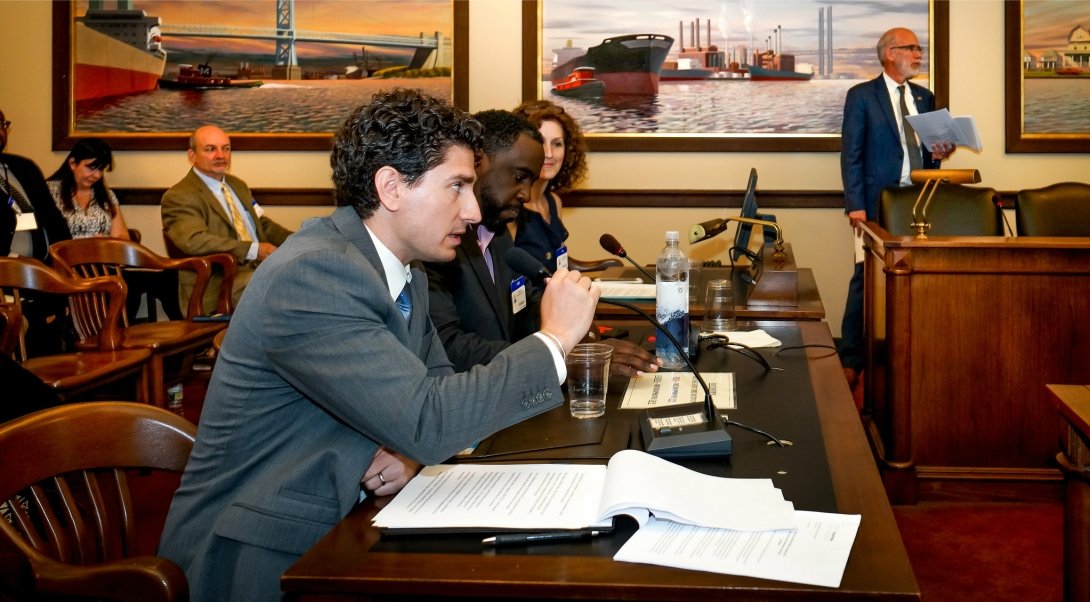Connecting the Dreams and the Details

Free Press Action’s Mike Rispoli testifying in the New Jersey Statehouse.
Timothy Karr
When you devote your career to public-interest advocacy, a big part of the job is sounding the alarm about terrible things that are about to happen and trying to stop them.
Sometimes it’s about making something awful slightly better. (It’s also about being in a lot of meetings.)
Another part of the job — one of the best parts — is dreaming up the ideas that people think will never amount to anything.
So it’s important to celebrate when they actually do.
We want to lift up two recent victories that Free Press helped make possible. These are shining examples of how much work it takes to turn ambitious ideas into policies and programs that will actually improve people’s lives.
On Wednesday, the New Jersey Civic Information Consortium announced its first call for grants, an important milestone in the years-long effort to build a new public source of funding for local news-and-information needs.
Six years ago, this was just a concept being kicked around the Free Press offices (back when we went to offices). We took that idea, turned it into a legislative proposal, lobbied and built bipartisan support, held events in every county in the state, passed a bill through the state legislature, got funding, lost funding, got it back, and soon will be giving away the first $500,000 — which is just the start.
So much credit for this accomplishment goes to News Voices Director Mike Rispoli, who now sits on the consortium’s board, for building relationships, bringing in allies and tenaciously advocating to make this a reality alongside stalwart partners like the Dodge Foundation, the Democracy Fund and the Center for Cooperative Media at Montclair State University (to name just a few).
We’ve written before about why the Civic Information Consortium is such a big deal. The consortium represents a first-of-its-kind state model for funding to support quality local journalism, promising media startups and other efforts meant to better inform people and promote civic engagement. It will prioritize serving low-income communities, communities of color, immigrants and rural residents.
We believe it can be a model for other states and federal policies to finally address the crisis in journalism — and just as importantly, it shows what can be accomplished when you combine creative policymaking and old-fashioned organizing with a refusal to accept the status quo as the only option.
The other big win we helped make happen was the creation of the Emergency Broadband Benefit, the $3.2-billion program in December’s recovery bill that will provide $50-a-month subsidies ($75 on Tribal lands) to cover the cost of an internet connection for low-income families, students and others who have lost jobs or income due to the COVID-19 emergency. Last week, the FCC finalized and unanimously approved its rules to carry out the program.
The Free Press Action team worked incredibly hard alongside a group of allies to advocate for this program in Congress and helped the FCC get the details right. Most recently, we filed a series of detailed comments with the agency that are cited in the final order. And Matt Wood, our VP of policy, testified at a congressional hearing on “Broadband Solutions to Pandemic Problems” on Feb. 17.
“COVID has changed everything,” he told Congress, “as social distance showed beyond a doubt that broadband is an essential utility for learning and livelihoods. Yet it’s also changed nothing, merely highlighting and heightening the racial injustice and income inequality at our country’s root.”
The details of how to best implement this program are as wonky as it gets. But the results are what matter: moving real money into the hands of the people who need it most to get and stay connected to the internet. None of this was even on the table a year ago. Now it’s actually going to get into people’s pockets.
That’s the kind of work that support of Free Press and Free Press Action makes possible: connecting the dreams and the details, refusing to settle for Washington’s narrow definition of what’s possible and then proving what we can accomplish. We still have so much work to do, but this is real progress.